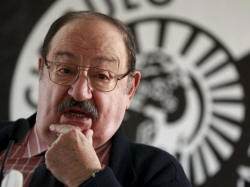|
 Umberto
Eco, Italian author of 'The Name of the Rose,' dies at
84 Umberto
Eco, Italian author of 'The Name of the Rose,' dies at
84
 Send a link to a friend
Send a link to a friend
[February 22, 2016]
By Philip Pullella
ROME (Reuters) - Italian
author Umberto Eco, who became famous for the 1980
international blockbuster "The Name of the Rose", died
on Friday, Italian media reported. He was 84.
|
|
 La Repubblica newspaper said it had been informed by the
family that Eco died late on Friday night at his home in
northern Italy. La Repubblica newspaper said it had been informed by the
family that Eco died late on Friday night at his home in
northern Italy.
Eco was virtually unknown outside university circles until well
into middle age, when he found himself an international
celebrity overnight after he published his first novel, an
unorthodox detective story set in a medieval monastery.
"He was an extraordinary example of European intellectualism,
uniting a unique intelligence of the past with an inexhaustible
capacity to anticipate the future," Prime Minister Matteo Renzi
was quoted as saying by the Italian news agency Ansa.
For the professor from Bologna University, then aged 48, it was
a late introduction into the world of international literary
fame and one that took many critics by surprise.
The "Name of the Rose", with its highly detailed description of
life in a 14th-century monastery and learned accounts of the
philosophical and religious disputes of the time, at face value
was hardly a novel to appeal to the average modern reader.

But the book's popularity lay in a clever plot line, the
masterfully evoked atmosphere of fear and gloom brooding over
the monastery, and the attractive central figure, unashamedly
modeled on the famous detective Sherlock Holmes.
As the novel opens an aging priest, anxious to record the story
before he dies, looks back on events that took place in 1327
when as an 18-year-old novice he visited a sinister Italian
monastery with his master, Brother William of Baskerville.
During their stay several of the monks are gruesomely murdered
and William and his young assistant are soon involved in a
detective hunt to track down the villain.
The unusual juxtaposition of a gripping storyline and erudite
scholasticism helped to explain why the "Name of the Rose" was
translated into dozens of languages, sold more than 14 million
copies and won several international literary prizes.
HIT FILM
The book was also the subject of a lavish film production
directed by Frenchman Jean-Jacques Annaud and starring Scottish
actor Sean Connery as Brother William.
Eco attributed the book's success to the similarity of
experiences shared by mankind in the fourteenth and late
twentieth century.
[to top of second column] |

"I hope readers see the roots, that everything that existed then -
from banks and the inflationary spiral to the burning of libraries -
exists today," he said in an interview with the New York Times Book
Review in 1983.
But he also expressed irritation about the apparent reluctance of
the international press to let him move on from that achievement.
"I can't spend the rest of my life talking about a book I left
behind me five years ago," he once complained.
The novel form was a new departure for Eco, who until "The Name of
the Rose" was best known for his highly academic writings on
semiotics, the study of signs, and more topical weekly articles in
the influential Italian political magazine L'Espresso.
His second novel, "Foucault's Pendulum," was less successful
internationally but still highly acclaimed.
His last novel, "Numero Zero" (Number Zero), which was set in an
Italian newspaper newsroom, was published last year.
Born in the northwest Italian city of Alessandria on Jan. 5, 1932,
Eco was the son of an accountant employed by a manufacturer of iron
bathtubs.
His father wanted him to become a lawyer but he chose instead to
study philosophy at the northern University of Turin, where he
became fascinated by the medieval world.
After taking his doctorate in 1954, Eco started working for the
recently established national broadcasting network RAI preparing
cultural programs and gaining a lasting interest in mass
communication.
(Reporting by Philip Pullella; Editing by Sandra Maler)
[© 2016 Thomson Reuters. All rights
reserved.] Copyright 2016 Reuters. All rights reserved. This material may not be published,
broadcast, rewritten or redistributed.
 |